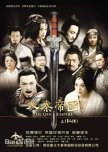
The Spy Who Loved Me.
This espionage thriller about the making of a communist spy begins in 1936, a pivotal year in modern Chinese history for both then ruling Kuomintang and the rising Communist Party of China (CPC). The look and feel of this Republican era spy drama from the muted palette to the understated characters to the way even action scenes are shot is markedly different from its flamboyant, glamorous and absurdly bullet proof peer, The Disguiser. What I like about The Rebel is the realistic portrayal of spies who are much more like George Smiley than James Bond. None of the main characters have deep political or ideological convictions beyond a burning desire to expel the occupying Japanese forces from China, thus their allegiances and motives are easy to understand and relate to. The dumbing down of the competing ideologies and political factions of the day however gives the overall impression of a lack of substance that is at odds with how seriously this drama takes itself. And that is my biggest gripe: yes, those were chaotic, stressful and dark times and spying is a serious business but does it have to be so completely and utterly lacking in wit and humor?The drama opens in a thrilling and suspenseful way with the arrest of a CPC operative by Chen Moqun, the head of the Shanghai district of the Fuxing Club, which is the Kuomintang's secret service. Together with his young protege Lin Nansheng, they use psychological warfare to turn him and use him to try to weed out the Mailman, a long hidden spy in their midst. Thus begins a chilling, suspenseful cat and mouse between two equally matched spymasters trying to out manoeuvre one another. This was by far the best arc of the drama, anchored by masterful performances by both Wang Yang (Chen Moqun) and Wang Zhiwen (Gu Shenyan). This is one of those rare dramas where the villains steal the show and on many levels they are more cunning, more ruthless and more capable than the protagonists. Chen Moqun is by far the, best most interesting character and the only one that is written with some humor - a complete sociopath, terrifyingly intelligent, flamboyant, suspicious, foolishly blinded by Lin Nansheng's competence, a surprisingly reluctant traitor and a wild party animal! Both lead actors are completely upstaged by the veteran actors for most of the drama.
I am a huge fan of Zhu Yilong and it is clear from how gaunt he looks and from the intensity of his acting that he really poured himself into this role. And he is a terrific actor so it is not to say that the role is not well acted, there are some really good moments. But overall Zhu Yilong delivers a cautious interpretation of the character and one that is not noticeably differentiated from his past roles. He has the most incredible, expressive eyes that together with the tiniest facial muscle movements, can convey an incredible range of emotions and in this case, way too many emotions. Zhu Yilong's interpretation of the character is more fitting for someone who accidentally and reluctantly becomes a spy but Lin Nansheng is a young man that voluntarily joins the spy academy and graduates practically at the top of his class - he should be more cold hearted and have a better poker face to begin with. As much as I appreciate seeing how events and relationships reshape his values and ideals over time into burning conviction, it is better to have to occasionally guess at his emotions rather than to see everything written all over his face. It is telling that later in the drama when he matures into a colder more inscrutable spy, they cover his eyes with tinted glasses to stop them from spewing his guts. His journey is portrayed as very lonely and intensely introspective; so much so that he doesn't seem to connect with most of the main characters. Thus when he mourns their loss, it doesn't always resonate.
Zhu Yizhen starts out as an archetypal character for this genre - a passionate young student CPC member that is perplexingly inspired by Leaves of Green, Walt Whitman's greatest, heavily democratic works. I don't mind the spy who loved me trope so I was really looking forward to watching her turn Lin Nansheng, recruit him and them work together as a kick ass spy team. But unfortunately it doesn't quite play out that way and she doesn't become the strong female lead character I was looking for. She remains pretty much a passionate, reckless amateur and damsel in distress that needs saving all the time. As much as I like that all of the CPC spies are written to be very fallible in the vein of John LeCarre's spies, she really takes the cake in terms of incompetence. What I find most unbelievable is she falls for the same grift twice! The only mission she manages to complete successfully is the final one. Tong Yao's portrayal of this character is textbook but bland and forgettable and her frequent blank stare with lips slightly parted gets really old very quickly. There is no spark between her and Lin Nansheng so I never bought into their rather pedestrian love story. Lin Nansheng's relationship with Lan Xinjie is deeper, far more complex, better developed from many dangerous missions and much more moving.
The first arc of this drama is everything you want a spy thriller to be. Each progressive arc is less good and they don't transition that well, leaving a feeling of anti-climax. The latter half becomes noticeably less tightly written and loses suspenseful intensity. Characters start popping up out of the blue from nowhere whenever someone needs to be rescued. Lin Nansheng's classmate has a particular knack for showing up at the right place at the right time. In order to advance the plot, many of the most important characters get dumbed down to be rather cursorily written off to make way for Lin Nansheng to step up. I didn't like how some of the best most interesting power dynamics between Chen Moqun, Gu Shenyan and Wang Shian fizzle out without coming to a climax, a moment of truth and closure. Thus when Lin Nansheng comes of age, he isn't even going up against truly worthy opponents and there is no psychological thrill. The last arc is the weakest, it is too long of a time jump, deviates into patriotic tropes, gratuitous sacrifices, leaves open threads and like most of the arcs, comes to an anti-climatic and very predictable end.
If I have to rate just the first arc of this drama, it is at least an 8.5 or a 9.0. Unfortunately the storytelling doesn't hold up and the second half is at best a 7.5-8.0. I really dislike dramas that fade at the back half so I rate this at 8.0-8.5. I would also note that I have read and watched a lot of amazing spy thrillers so I tend to be tougher on this genre.
Was this review helpful to you?

Rules are made to be broken.
The bold and unconventional baroness Ban Hua is a one of a kind character. Her doting uncle is the emperor of Daye; her father the hedonist Marquis Jingting has more money than God; she inherited her grandfather General Ban's martial arts prowess and she has a wardrobe to die for. For her, rules are made to broken and her flamboyant devil-may-care attitude and daring exploits have the noblemen smitten and dazzled and the noblewomen choking with envy. If there is one stain on her charmed existence, it is that all her engagements go down in flames, to the amusement of the Daye elite.When the incomparable Ban Hua's path crosses with that of the elegant Rong Xia, Count Chengán, Daye's most talented and most eligible gentleman, their courtship becomes the talk of the town. The best thing about this drama is Ban Hua and Rong Xia's character design and their hilarious and sizzling interactions that light up the screen. The comedy is very well written and blithely presented by the lively cast. The Ban family is one of the most uproarious and delightful drama families I have seen in a long time. Ban Hua's biggest fan, her charming, spendthrift rogue of a younger brother Ban Heng is my favorite character. Both Guan Xiaotong and Hou Minghao hit all the right notes in their performances. Guan Xiaotong delivers a curious air of exquisite vulnerability that softens Ban Hua's imperiousness and arrogance. While Hou Minghao's Rong Xia is looks too handsome and unattainable and is so measured and powerful in a soft spoken way that he is the perfect foil for Ban Hua's impetuousness.
Unfortunately the plot does not at all do justice to the all-around strong performances by the cast. The history between Daye's aristocrat families and secret plotting that led to the Rong family's downfall is quite interesting and well conceived. I enjoyed watching Ban Hua and Rong Xia learn to trust each other and work together against their enemies. The drama would have been best served wrapping up after the take down of the villain of that early arc. After that, the plot feels very forced and succumbs to tropey, boring and contrived delusional love rival tropes. All of the progress the couple makes is undone to create unnecessary misunderstandings and ridiculous and unimaginative palace coups. I was left with the impression that the couple can't communicate or work together and is surely doomed to divorce. The second half is as boring and ridiculous as the first half is interesting and engaging. Rong Xia's character in particular is destroyed as he goes to inexcusable lengths to save his love. The character interactions are funny throughout and that is the only thing that kept me watching until the end. It is still overall a decent watch but nothing to write home about. This is overall a 7.5/10 but the first half feels closer to an 8.5.
Was this review helpful to you?

Murder is like potato chips: you can't stop with just one.
This drama is not for the faint hearted. It is a graphic and terrifying account of a gang of serial killers that preyed on drinking girls in Harbin, China from 2002 to 2012. Led by the cruel and depraved Deng Ligeng, they victimized women who were alone and would not be missed. A clogged pipe led to a grisly discovery that put them within a hairsbreadth of being captured. They go on the run across the country but murder is like potato chips: you can't stop with just one. With police chief Peng Zhaolin hot on their heels, this gang of four continues to stake out potential victims. Unfortunately this time they tangle with the wrong victim and barely pull off another audacious escape. They manage to disappear without a trace for a decade until a chance encounter sheds some light on their whereabouts.This drama has been mired in controversy that unfortunately cast a shadow over what a well crafted police procedural it really is. The cinematography and storytelling approach is vividly gory, full of psychological tension and a menacing and increasing sense of dread and mortal peril. Zhao Jinmai truly impresses in her role as Zhen Zhen, a troubled, defiant teenager who discovers an inner strength she didn't know she possessed in her primal struggle for survival. I haven't felt such a raw combination of sheer terror, helplessness and rage in a very long time. Her desperate bid for freedom is the highlight of the story and where the dramatic tension in the plot peaks. While faithful to actual events, the storytelling deflates into another six episodes that are mundane by comparison. While the idea that serial killers can so easily assimilate back into society and walk among us is unspeakably chilling, it is a point that could have been made more succinctly. Even though I was rooting for Zhen Zhen and Peng Zhaolin to get justice, the way they went on with their lives wasn't interesting. The was also something lacking in Zhao Jinmai's portrayal of Zhen Zhen's nightmares and her PTSD as the dramatic tension in the narrative had abated by then. The final episodes linger too long on characters I didn't care about.
The most damning criticism of this drama is that it glorifies and humanizes serial killers. As someone who watches many similar Western dramas inspired by true crimes, that does not really seem to be a fair assessment. What is true is that the production could have been more sensitive to the feelings of survivors and families of their victims. And it is missing a "fictional events" disclaimer to make it clear that they took dramatic license with true events and characters. There is also an attempt at dark comedy in the beginning that just didn't land well. It is not advisable to eat or drink while watching this drama. All of the actors in villain roles delivered phenomenal performances that brought those fiends and their dark dynamic to life in a horrifying and fascinating way. Wang Qianyuan deserves a special mention as Deng Ligang, the mastermind who terrified the living daylights out of his own gang and Wang Jiajia as the no less perverted killer who dares to stand up to him. But make no mistake, Deng Ligang, Song Hongyu, Shi Bi and Ji Dashun were portrayed as they were; vile, cruel and cunning monsters who coldly and calculatedly lured their victims to a horrible end. Yet they must have had a certain amount of charm in order to persuade their victims to let them into their lives like that. Acknowledging that they were also bold, cunning and charismatic is not the same as glorifying or humanizing them and indeed I didn't feel one iota of sympathy for any one of them from start to finish.
This sinister and gripping story starts strongly and has some outstanding hair-rising moments but loses momentum after peaking too early. My biggest issue with it is at the end, I didn't care about any of the characters, including Zhen Zhen. I found Peng Zhaolin to be an exceptionally banal version of the doggedly persistent cop archetype. I rate the first eight episodes in the 8.0-8.5 range but the final six episodes barely a 7.0 for a 7.5/10.0 overall.
Was this review helpful to you?

A half truth is a whole lie.
风中的火焰 or Flames in the Wind is a slow paced, Northeastern suspense thriller in a similar vein as 2023's hit The Long Season. It is set in a a desolate mining town in Ningxia where time moves slowly and the future looks bleak. After graduating from high school in 1994, three childhood friends are chomping at the bit to escape from their dead-end town. Both Liu Bai and his girl Mei Wei are university bound, if they can somehow find the funds to make it work. The less academically inclined Lei Fugui means to work his way up in the world. One night, they find themselves at the wrong place at the wrong time and become entangled in a secret that changes their lives and sends them down divergent paths.Ten years later, as the town is being relocated, fate draws the three friends back to the town they had tried so hard to leave behind. A burnt corpse is dumped outside the police station. It reminds veteran cop Chu Zhi Qiang of a cold case that shook the town a decade ago. He must convince Zhang Tao, his new captain to relook at the case with new eyes. Their investigation reopens old questions about what exactly happened that one night so long ago. Nobody really knows the full story; everyone's account is some combination of their own version of the truth and speculation. But a half truth is a whole lie and thus narrative skilfully builds a compelling case against each of the suspects based on their half-lies.
While the narrative builds tension masterfully, this is one of those suspense thrillers where there is no criminal mastermind or genius crime busting cop; it is just about bad luck, worse decisions and human tragedy. What makes it superb is the acting; it is so authentic and raw that I deeply empathised with the characters' struggles, motivations and imperfections. Jiang Qiming never disappoints and his portrayal of Liu Bai as an enigmatic, still waters run deep kind of character anchors the narrative. Underneath the surface lurks so many complex emotions; guilt, anger, duplicity, desperation, love-hate, regret; all conveyed with nuance and micro-expressions. I was surprised by Yang Caiyu's Mei Wei. I thought she was just a pretty face playing a pretty face and I disliked Mei Wei's selfishness and sense of self preservation from the get go. But as she reveals her vulnerabilities, I felt terribly sorry for this coal miner's daughter who was born in the wrong town and her thirst for a better life. I also could see why the equally mercenary Fugui preferred a much simpler woman to such a complicated one.
Where this drama stumbles is in the pacing, the overall plot logic and the ending. The storytelling is well paced and riveting until the final 4-6 episodes, where the final denouement is delayed to linger too long on Zhang Tao's boring marital and personal issues. Plot logic is an issue from the start as this drama is helmed by a Taiwanese director that is clearly unfamiliar with China's legal framework. Some of the issues Chinese netizens highlight is that in that kind of town, a security guard is effectively deputised as a policeman when it comes to enforcing the law on premises. The legal framework is also depicted as a very harsh one that doesn't take into account mitigating circumstances including self-defense and hands out inequitable sentences that don't distinguish between murder and manslaughter. After the fillers, the ending felt anti-climatic, incredibly sad and unnecessarily cruel. On some level it doesn't matter because this is really a character story that delivers in spades. On some other level, it left me feeling somewhat dissatisfied because there was no justice or closure, just a legal process. I do highly recommend it for the acting but I cannot rate this better than 8/10 because the plot is unworthy of this cast.
P.S. Leslie Cheung's iconic 1990s Cantopop hit The Wind Blows On 风继续吹 perfectly captures the ethos of this story.
Was this review helpful to you?

Frostbite.
The Frozen Surface is a dark and suspenseful northeastern revival mystery thriller. It is set in the desolate, melancholic northeastern suburbs of Harbin, Heilongjiang, a part of China known for its dastardly dry and freezing cold winters. The dialogue is mostly in Northeastern dialect, which I am not familiar with enough to comment on its authenticity. Despite its wild natural beauty, this area is among the slowest growing economic regions in China. The general lack of economic opportunity and the dominance of a largely industrial manufacturing base forms the general remote backdrop for this narrative. The timeline alternates between the 1990s which were very difficult times and 2005, when things are notably better but still a far cry from China's advanced coastal cities.The violent death of a crime boss and two others throws Lanhe County in disarray as various vested interests scramble to position for the fallout. There are almost too many suspects from a jilted lover, mob rivals, the nephew and heir apparent, the ex-wife and an ex-con; all with motive, means and opportunity. Police captain Guan Yu and his team investigates under time pressure to solve this high profile case. The waters are further muddied with an unexpected confession. Very much like 2023's hit The Long Season, the social commentary about the cruel times, hardships the main characters endure and the desperate, heartless and at times tragic choices they make eclipses the mystery itself.
This drama starts out very well but tries to do too many things. What anchors it is fantastic acting by Chen Jianbin (Guan Yu) and Hu Jin (Yang Si). I thoroughly enjoyed their cat and mouse and how a silent empathy developed between them. Even though some characters do bad things, I feel quite sorry for them. There are also a number of absolutely crazy, bloody and scarily violent maniacs in this drama that adds to the growing sense of dread as the plot builds to a climax. Unfortunately, the main villain's origin story isn't empathetic and they made too many bad decisions along the way to qualify as smart. Some plot points are too obvious or are revealed too early. The logic of many characters collapses into the final two episodes and the plot does not tie together tightly at the end. By then, both the director or scriptwriter's brain must have succumbed to frostbite because so many things just don't make sense or are not well explained.
This is a drama that starts slowly but builds up suspense quite well in the first half. The character stories are quite interesting but sad and they are well portrayed by veteran actors. Unfortunately the mystery part crashes at the end. As an avid mystery watcher, I can only rate this a 6.5/10.0. Viewers who are more interested in the setting and the character stories may rate it a bit higher.
Was this review helpful to you?

Divide and conquer.
Qin Empire 2 or Qin Alliance on Netflix is about Ying Si or King Huiwen of Qin who reigned from 338-311 BC. More than a century later, Ying Zheng or Qin Shihuangdi succeeded in unifying the Warring States(221 BC). In an interesting parallel, Ying Si was the first of the Dukes of Qin to name himself 王/Wang or King. His more well known descendent subsequently declared himself 皇帝/Huangdi or Emperor. I watched this out of order after completing Qin Dynasty Epic, which is Ying Zheng's story and the final installation of this four part series that doesn't have to be watched in order. This review is going to be short as there is an excellent comprehensive review by @Skibbies. I will try to avoid repetition and focus on incremental observations, especially on how this differs from the final season.What is most striking is that Ying Si really had it hard. When he came into power at eighteen, his father's clan and advisors were not fully behind him. And the Qin state was not especially powerful and existed in imminent danger of being swallowed by one of the other Warring States. Survival, much less ascendency was by no means a foregone conclusion. But Ying Si was a true conqueror - cunning, shrewd and utterly ferocious. Fu Dalong's masterful performance captures the remarkable indomitable spirit of the character and the sheer enormity and necessity of the task in front of him. This makes Ying Zheng, though so much more renown in history, seem like a lesser conqueror by comparison. For by then, Qin was already a superpower where the outcome was already inevitable.
The best parts of this drama are about how with the aid of his advisor and lifelong friend Zhang Yi, Ying Si was able to prevent five states from forming an alliance against Qin. They did this by some brilliantly crafted divide and conquer strategies that involved trickery, diplomacy and outright brutal and bloody warfare. Even though I was moved by Ying Si's deep relationship with Zhang Yi, I detested all of the so called genius strategists in this show, including Zhang Yi. I just could not stand their arrogance and sense of intellectual snobbery and how vile and evil these turds of history were. Their loyalty is not to king and country but can be bought by whoever could give them the most chess pieces to play with with little respect for the sanctity of life. To them, war is just a giant chess board where they can showcase their talent to the world. In the end Ying Si prevailed over all of them not because Zhang Yi was smarter or more loyal but because for Ying Si it was a battle for survival won by blood and sacrifice. His army would have gone to the ends of the earth for him because even while he took them to victory and glory, he truly felt the loss of and grieved for his fallen soldiers.
Even though I am sure it is heavily romanticized, I loved the portrayal of Ying Si's passionate and tempestuous relationship with the wild and wanton Empress Mi. What a woman! She lived life large, loved and hated and was at the end the bravest most loyal custodian of Ying Si's legacy. The drama lost momentum for me after Ying Si's death but the final two episodes where Empress Mi was both ruthless and compassionate at the same time ends this on a strong note.
While this production looks dated and lacks the aesthetic and cinematic appeal compared to more recent historical dramas, the acting of the main characters is top notch. The telling of the story overall, especially in the art of war is well done, not overly complex or difficult to follow. I could have done without knowing so much about Zhang Yi's personal life but there were some decent moments. This an 8.5 for me largely because I cannot praise enough how Fu Dalong's Ying Si is unforgettable and everything a Qin conqueror should be.
Was this review helpful to you?

Hard core gore.
This review covers both Season 1 and Season 2 as it does not make sense to review them separately.This is a gripping and fast paced psychological crime thriller that explores the dark side of justice and how the road to perdition is paved with just intentions. In a desperate race against time with few promising leads, Captain Tan's investigative team are under intense pressure to put a stop to a bunch of brutal serial killings. Prison inmate and gifted former profiler and attorney Liang Yandong, is on trial for murder and is convinced that his case is linked to the serial killings. He persuades hungry young rookie cop Ren Fei to share information in the case with him in exchange for his assistance with profiling the serial murderer. The first season solves the first case only to reveal a larger conspiracy that intertwines with a devastating unsolved cold case.
I really enjoyed Vic Zhou's performance as the inscrutable Liang Yandong, especially in the beginning when he teases us with the question of whether his motives are benign. Among the big name cast, his performance pulls the production together as his rapport with each of the main characters seems the most natural. Sandrine Pinna also pleasantly surprised me in her ability to pull off a complex role although some of her scenes in the latter half could have been more nuanced and less forced. Although I like Christopher Lee, his Captain Tan did not really connect with me or with the other members of his investigative team. Part of the problem is that Zhu Tingdian's performance as Ren Fei is hit or miss and his character interacts the most with Captain Tan. His Ren Fei "clicks" with Liang Yandong and Teresa Daley's Ji Siqi but not so much with Captain Tan and the rest of his team. The broader investigative team's dynamics is also not convincing enough to inspire me to root hard for the "good guys" and feel pulled into their mission. To some extent, the cops in this show are dumbed down a little bit too much so that Liang Yandong can look really smart.
The plot overall is fairly tight and it fast paced, full of good twists including a hidden antagonist that reveals themselves a tad on the early side. There are some holes and some suspension of disbelief is needed but it moves so fast and is so action packed you won't have time to dwell too much on on them, which is fantastic. The ultimate villain is known fairly early on and their motives are not that convincing or well explained but there are enough other interesting characters. By pretty much the same team as the highly acclaimed and more memorable Victim's Game, I like this better as a pure suspense thriller for its better focus on a well explored big case that ties everything together and its lack of digression into social issues.
My main problem and reservation with this drama however is that it goes far beyond hard core gore. In general I am fine with dark themes and I don't get triggered that easily but what I found deeply disturbing about this drama is its heavily in your face misogyny. You will be repeatedly treated with gratuitous, extended gore images of women being tortured and mutilated. It is completely unnecessary to the plot or the exploration of the killers' psyches. To give the production the benefit of the doubt, I can tell from The Victim's Game that this team overly delights in showing off their technical prowess at detailed, realistic and almost pornographic gruesome scenes. However I cannot help but be offended and put off by the almost exclusive focus on abusing women and in such loving and repeated detail. So I am really struggling with this review and avoided writing it for quite some time. If they had toned things down (a lot), I would be tempted to give this an 8.0/8.5 but my anger at the extreme misogyny makes me think 6.0/6.5. I am just going to make life easy for myself and call this a 7.0 while acknowledging that is maybe a bit unfair. If you can get past the hard core gore, this is a very enjoyable thriller for fans of the genre.
Was this review helpful to you?

Did you ever dance with the devil in the pale moonlight?
Did you ever dance with the devil in the pale moonlight? What was it like? Did you leap into the abyss with wild abandon? Lose your heart, body and soul? Was it worth indulging in every lucious, forbidden moment? Find out all about it in Till the End of the Moon, a heart-stopping account of Li Susu and devil incarnate Tantai Jin's scorching entanglement of love, hate and misunderstanding that spans 500 years and multiple realms.In a desperate attempt to stave off the resurrection of the the devil god, a bunch of grey haired cultivators send an intrepid young cultivator Li Susu back 500 years in time to stop Tantai Jin from turning into the devil god. Yeah, you really have to hand it to these crusty old cultivators - when all else fails, they sacrifice a virgin and hope for the best! Susu assumes the identity of Ye Xiwu and is tasked to kill Tantai Jin after tempting him out of his... uhm... evil bone! I almost choked with laughter at the sheer audacity of such a naughty plot setup!
This angsty xianxia's unique premise is that the main protagonist Tantai Jin is a fiendishly compelling and tragically misunderstood character; literally a prince of darkness. Luo Yunxi is mesmerising in this role - his diabolical crooked smirk, the maleficent glare, the taunting cock of an eyebrow, the elegant devil-may-care gestures and the imperious snap of a finger. But it is his shatteringly wounded expression and how with a moment of stillness he screams silently with pain oozing from every pore that makes me root for the devil and to hell with the realms. My favorite part of this drama is how kindness and love gradually changes the dark, lonely and twisted Tantai Jin into a best yet still flawed version of himself. Bai Lu on the other hand could have delivered a more nuanced performance as Li Susu. Her Susu is so unwavering in her duty to the realms that I could not tell when she fell in love with Tantai Jin or if she ever really did. That said, there is an exceptional spark between the leads that results in both hilarious and smoking hot moments. I could see sparks fly in every direction during Ye Xiwu's seductive dance that tempts the devil in his liar. This drama's greatest hook is Luo Yunxi's portrayal that dimensions his character beyond the screenplay and his searing onscreen chemistry with Bai Lu.
There are four distinct arcs in this drama, the first of which is the strongest and most enthralling mortal arc. I loved everything about this arc and if this drama had held that level, I could have easily rated this over 9.0. By design, the second visually stunning dream arc also shines in many aspects but sags as a result of lazy writing and overuse of tired xianxia tropes. The third and fourth arcs recover somewhat but never quite hit the addictiveness of the first arc. Part of the problem is the second couple is poorly written, has no chemistry and is not empathetic. Their insipid story is overshadowed by that of foxy Pian Ran and unswerving Ye Qingyu's passionate and addictive love story, which ends way too soon. While all of the arcs have good moments, the plot is moved along almost solely by misunderstandings. This is the hallmark of indifferent screenwriting and it undermines the intelligence and agency of the main characters. With a little bit of effort, they could have gotten to the same place without undermining the characters and disengaging the audience.
In terms of production values, this is a big budget drama and it shows but not in the best ways. The make up was often over the top and not flattering. I am visually scarred by the excessive blood spitting that took it to the next level in terms of bloody teeth and the excessively bright contact lenses absolutely ruined many emotional moments for me. I did not at all enjoy the pantasmagorical CGI orgy game world that hijacked all of the clashes between good or evil including the beginning and ending scenes. The over-lit glare distracted from the emotion and the intensity of Tantai Jin and Li Susu's most pivotal scenes.
The way this drama ends is both fitting and inevitable in that both Tantai Jin and Li Susu fulfill their destiny. My problem is with how they get there. It could have been a lot more palatable if it were better written. But my biggest gripe with it is that the drama never convinces me that humanity or the realms are worth saving. Or that there is cosmic justice. After all, Tantai Jin was just jinxed from birth but he was hardly the worst, most evil character. What I resent most is that the hypocrisy of the moral sects is never exposed and that the truly evil characters get outcomes they don't deserve. The original works this drama was based on may have been very good but the adaptation is not. The screenwriters should all hide in shame and do all they can to try to erase their names from this adaptation. Nonetheless I rate this 8.5 because anything less would be an injustice to Luo Yunxi's devilish, simply irresistible and unforgettable portrayal of Tantai Jin.
Was this review helpful to you?

Turn back the clock.
See Her Again or Sun and Stars/太阳星辰 is an riveting walk down memory lane. It is written in the vein of the old school Hong Kong cop genre that serves up a dash of time travel with a great deal of suspense and waves of nostalgia. The narrative unfolds across two timelines; first in 1993 pre-handover Hong Kong and then in 2018; over a decade after the end of British colonisation. The ethos of the story is a yearning for bygone times; contrasting the Hong Kong that was then with the Hong Kong that is now. What I like most about it is it doesn't suggest one is better or worse; in fact it depicts Hong Kong as different and yet somehow still the same. It is a drama that should only be watched in Cantonese because Cantonese colloquialisms are uniquely Cantonese in a way that simply won't translate into Mandarin even when the words are exactly the same.This is by far William Chan's best role to date. He is truly in his own skin in his native Cantonese as a hard-boiled Hong Kong cop Yeung Kwong Yiu; a dedicated officer who has no problem bending the rules to catch criminals and gangsters. After a devastating fire, the traumatised city is further terrorised by a series of brutal murders. As the hunt for the serial killer intensifies, Kwong Yiu struggles to find time for his wife and young daughter who also need him. In the midst of a high speed chase hot on the heels of the killer through the maze of 1990s Hong Kong's crowded, neon-lit streets and claustrophobic buildings, Kwong Yiu falls down a time tunnel. He finds himself flung twenty-five years into the future, to an unrecognisable Hong Kong. He is shattered when he discovers that life went on without him and not in the best of ways. The killer is still at large and may have resurfaced after many years. He must convince his old friends on the force to include him in their investigation in an inter temporal quest for justice and a desperate gamble to turn back the clock.
Despite the gritty noir flavour, the slick camerawork, the vivid Hong Kong images, a flawed antihero cop, morally complex characters, blurred lines between good and evil and the evocative soundtrack, there is something missing that I can't quite put my finger on. The camaraderie and banter between the cops just doesn't hit the right notes. The sarcasm, dark humour and cynicism that is belied by actions that makes their bonds feel lived-in is missing. Maybe the huge time leap made some of these interactions feel a bit forced and awkward. What worked quite well however was the chemistry between William Chan and Cya Liu and the moving way in which their relationship evolved. The mature, patient yet puppy dog-like hopefulness in William Chan's eyes as his Kwong Yiu tried to break through Hoi Ching's cold and disapproving facade made me want to laugh and cry at the same time. I really enjoyed how they made this dislocated and emotionally charged father-daughter connection progress over time. I rooted for Kwong Yiu over foster father Chan Tsz Tsun (Stephen Fung) all the way in terms of worming his way back into his daughter's heart.
The high-stakes suspense plot is tight and unfolds at a thrilling pace with a few good twists and an unexpected ending. The antagonist roles were superbly acted even though some of their motives were too extreme, overly melodramatic and too ruthless with high collateral damage for me to feel sorry for them. The fast paced ending left little room for regrets, recriminations and sentimental adieus, which is a relief. Overall a very enjoyable nostalgic watch even though the narrative doesn't quite capture the distinctive gritty, cynical and defiant quintessence of the Hong Kong cop culture. Coming from a Hong Kong director that started out at TVB, this is a little bit disappointing. The unfathomable decision to re-record Beyond's 1990s popular hit Lover 情人, replacing Wong Ka Kui's deep and textured vocals with that of an insipid female vocalist is a crime in and of itself and reflective of everything wrong with this drama: it tried but is nothing like the real thing. I enjoyed it but can only rate this knock-off wannabe Hong Kong police story a 7.5/10.0.
Was this review helpful to you?

Rebel Without a Cause.
This is one of those magnificent, high budget productions that starts so strongly that I kept shushing that inner voice that whispered "masterpiece" for fear of jinxing it too early. Sixty-eight episodes later, I am sad to say that despite some excellent arcs and moments, this drama falls far short of its breathtaking early promise.*** Be warned that there are mild spoilers in my review - I will avoid major spoilers. ***
Wang Xuan or A'wu, the titular character is a fictional only daughter of Prime Minister Wang Lin, head of the Langya Wang clan whose formidable political influence straddled several early dynasties since Eastern Jin. Their hold onto power is secured via an incestuous (and icky) pact with the imperial Ma family whereby for twelve successive generations, the Wang clan heiress is chosen as empress. Wang Xuan's legacy 王氏之女 母仪天下 literally means the Wang clan daughter is the "mother of the world" or the empress. Thus he who attains Wang Xuan, attains the world. This is not just a prophecy; she comes with the power and influence of the Wang clan who are kingmakers. The drama dumbs this down to be just about lovesick men after her ravishing and incomparable beauty. That is just icing on the cake and not the only aspect of her appeal to ambitious men who cannot otherwise legitimately claim the throne. This is with the exception of the the weak and foolish Zidan, a character who exist only to love A'wu. In this context, A'wu's expectation of a love match is unrealistic and not possible for any of the noble elite; marriages are political alliances where the best one can hope for is some affection that may or may not quite be love.
A'wu's first and most significant act of rebellion is against her destiny as empress and in doing so, she goes against her father and by extension her clan. This upsets the balance of power between the imperial Ma family and the Wang and Xie clans and sets an intense power struggle in motion. While her motives are naive, this is the first of many decisions she makes that undermines her clan's extraordinary grip on power. In fact, she protects the imperial family's birthright without questioning their worthiness. In this matter, she is indeed a rebel but one that lacks a just cause because excessive in-breeding has made each of the Ma heirs some combination of stupid, unfit and unworthy. That said, I saw character growth and could understand and largely empathize with her decisions until the arc that sees her return to the capital with Xiao Qi just past mid-way through the drama. Until then, the plot was well paced, suspenseful and the motives of the main antagonists layered and interesting enough to make this worthy of a 9.5/10.0. Unfortunately the drama peaks there and after that, the plot falls flat and becomes overwhelmed by tropey two dimensional villains with repetitive and boring motives. Wang Xuan's character regresses and she makes very questionable decisions, the worst of which culminates in a very shady mating dance that I cannot un-see no matter how many times I rinse out my eyeballs.
Xiao Qi and Wang Xuan's relationship is the best thing about this drama. Even though he didn't get enough screen time to do his character justice, Zhou Yi Wei 's Xiao Qi stole the show. It is so nice to see an actor looks and fits the part of a battle scarred, undefeated general in the role rather than some scrawny idol actor with baby smooth skin. Much more so than Wang Xuan, Xiao Qi is thecharacter that I really root for in this drama. He has riveting chemistry with Zhang Ziyi that compels me to keep re-watching the way their romance unfolds and progresses. It is freshly written and their natural and intimate interactions manage to avoid common drama relationship cliches. Both actors communicate deep and complex emotions with few words and tiny, nuanced changes in expression. Their relationship is not perfect - they have their share of challenges and conflicts. It is disappointing we don't get to see how they navigate their greatest relationship challenge as Wang Xuan is caught between protecting her first love and Xiao Qi's quest for justice.
What is super annoying is that Zidan could have been written to be a much more interesting character rather than one that is frankly a complete waste of screen time. He got such an absurd amount of time he was constantly popping up like a bad tart when all I wanted to see was Xiao Qi. It is understandable for Wang Xuan to have some lingering regret and affection for him but that is not well flushed out. The fact is she married Xiao Qi to save Zidan and at the end, she still rescues him while turning a blind eye to his crimes. It makes me wonder if he was indeed her one true love after all.
The crux of the problem is that Zhang Ziyi's portrayal of Wang Xuan lacks complexity. Her A'wu stopped becoming interesting the moment she grew up to be the more politically astute Wang Xuan. She becomes a suffocating paragon of virtue and forgiveness 母仪天下; the mother of her country and and inexplicably staunch defender of the (worthless) imperial family's absolute right to rule. She wears a perpetually aloof and haughty expression and does not let anyone forget that she belongs to nobility; that she has familial obligations and ties that a commoner and an orphan such as Xiao Qi could not possibly understand or relate to. While she is entitled to forgive her enemies for wrongs they committed against her personally, it is absolutely not her place to broadly dispense justice as she sees fit. She casually makes decisions of great weight and consequence as without any appearance of inner conflict or overarching ideology or sense of justice. If this makes her a rebel, she is one without a cause. I like Zhang Ziyi but this is not a role that she shines in. Despite not looking the part, I had no issue with her portrayal of the young A'wu. It is her Wang Xuan that ultimately fails me. I abandoned the novel because I disliked how narcissistic the character was written to be there. But in the novel ,at least she is very conscious of her beauty and charisma and wields it ruthlessly to accomplish her goals. I never imagined disliking her hypocrisy and sense of entitlement even more in the drama. It does not help that Zhang Ziyi's portrayal is so humorless she even takes the joy out of getting drunk off her ass. At least Wang Su is a fun and uninhibited lush, the kind of drunkard anyone can relate to.
My favorite character and the one that shores up the drama is Yu He Wei's Wang Lin. He is the only truly complex character that is smart without being infallible, unabashedly ambitious, cynical and unrepentant. I love how he gleefully, insightfully analyses situations and peels away the layers of righteousness and hypocrisy around him. There were many times I could empathize with and even support his cause.His plotting against emperor Ma is the drama's best arc. Wang Xuan is actually remarkably like him in terms of her innate arrogance and sense of entitlement as well as her ability to make bold decisions on important affairs of state. As he exits, she steps into his role as the silent force behind the throne with Xiao Qi as the military power that anchors her influence. She is truly her father's daughter in more ways than would make her comfortable if she could see herself. This does not come across clearly because Zhang Ziyi whitewashes Wang Xuan's character and does not dare to embrace her dark side. Everything comes to a full circle when father and daughter discuss love and marriage and she more or less admits that her relationship with Xiao Qi is not too dissimilar to that of Wang Lin's with her mother. It is convenient that she loves him but their marriage serves a purpose that is far grander and more encompassing than love.
While the ending is acceptable, it is in too many important aspects disappointing. Given that regime change is not a viable way to end this kind of drama, it should not have been written to make such a compelling case for it. ZIdan did not have to have been written to be such a jidan (鸡蛋) or a zero. It is obvious many important parts of the ending episodes were edited out which is such a sloppy thing to do when they could have substantially edited down the most insipid Wang Qian/Helan Zhen arc instead. As a result, there is no justice for the Neem Yu Shan massacre and we don't even get to see how this atrocious outcome was negotiated between Xiao Qi and Wang Xuan. Both characters but especially Xiao Qi, disappoint me greatly in this. Thus at the end of the day it does not look like anything substantive has changed or that the kingdom is in a better place or in the hands of more competent rulers. I really want to give this a 9.0 but with that ending, it is at best an 8.0. That said, it is still a very entertaining drama with a distinctly memorable OTP that you should watch. Just don't get fooled by the strong start into expecting a masterpiece.
Was this review helpful to you?

The Yin-Yang Master: Dream of Eternity
16 people found this review helpful
Cloudy with a chance of meatballs.
This highly anticipated movie has all the elements of a huge fantasy, suspense thriller hit: an unlikely bromance between a demon sympathizer and a demon hater; a powerful demon hiding in plain sight; a murder mystery and above all; a desperate conspiracy arising from an intense, obsessive love that risks all for a dream of eternity. It is beyond doubt a visual extravaganza that leaves viewers in no doubt of Guo Jingming's cinematic virtuosity. Unfortunately the production tries too hard to impress with technical pyrotechnics at the expense of good storytelling. As a result, the glowing magic circles and time portals that are allegedly knocked off from Marvel's Doctor Strange are over-used and characters are gratuitously transported to odd places; all unnecessary digressions for a ~2 hour movie.Despite the lavish images and sensationally choreographed action scenes that culminates in an apocalyptic clash with a demon serpent, the plot is flimsy and the characters are unevenly developed. This is a pity because this is hardly the first adaption of the popular novel Onmyoji; I have to believe the story has more substance and the characters are better fleshed out than what was served up in this version. The evolution of the relationship between Qingming and Boya from distrust, even antagonistic to lasting spiritual bond could have been more convincingly developed with better dialogue. The cursory development of the other main characters, stiff performances and stilted dialogue devoid of clever repartee or banter results in a lack of any tangible rapport and chemistry between the broader cast. This makes it difficult to empathise with most of the characters and what should be a moving, obsessive love story. But it is at least more convincing than the bromance between Boya and Qingming. I believe both Mark Chao and Deng Lun put in a decent effort but the script and storytelling falls too far short, there is only so much the actors can do.
Instead of peeling away the layers of the mystery after an intriguing introduction, most of the plot is just simply and abruptly revealed all at once so that we can get back to more heavy duty action and cinematic fireworks. In the thick of the fray, the story tends to shift to flashbacks, which would be frustrating if I am actually gripped by excitement. But even the climax of the action lacks intensity; there is no impending sense of doom or imminent danger. Boya and Qingming are just standing around chatting casually as if a gigantic demon serpent is not about to end everything. They are so lacking in a sense of urgency they could be discussing the weather forecast - "...cloudy with a chance of meatballs " while sipping beer. I never watched Doctor Strange so I have no view of whether some of it was plagiarised here but I have watched enough Marvel to know that the spirit and ethos of what makes the Marvel fantasy universe so enthralling is markedly not present in this movie. Anything that may or may not have been stolen is definitely in form over substance. All the ingredients for a good story are present but without even knowing the novel, I can already tell that the drama does not capture the essence of the original plot and characters. This sets a low bar for the Chen Kun version that premiers in a few days to beat.
Overall this is a decent watch for the visuals alone. I found many parts of it dull and draggy where it should have and could have really pulled me in. It is best watched in a group, whether virtually or in person. I rate this a 7.0 overall - I actually think its a 6.0 but I threw in 0.5 for the crowd pleaser shots of Deng Lun's cut upper torso (please PM me if you have his personal trainer's number) and another 0.5 points because my kiddie nieces really liked it and they always know better than I.
Was this review helpful to you?

Hijacked by the feminist manifesto.
In the Name of Blossom/国色芳华 picks up where Flourished Peony leaves off. I was expecting this second season to pivot toward the enigmatic Jiang Changyang's story and the plot focus to shift from Mudan's business ventures toward Changyang's court intrigue. The best part of this second season is how Mudan and Changyang's slow-burn romance finally catches fire. Their intense ardor as they transition from friends into lovers made my toes curl.Unfortunately, as the narrative soldiers on, it becomes quite obvious that the writers simply ran out of plot and should have wrapped this story in one 40-episode season. I was quite done with Mudan's story in the first season and saw no reason to revisit past trauma just to introduce conflict and unnecessary noble idiocy tropes into their relationship arc. With not enough runway to introduce new antagonists, they continued to beat a dead horse with Liu Chang and Li Youzhen, subjecting them to sink even lower into ignominy. As for the final, bloody rebellion arc, there were too many predictable plot twists and reversals and fake deaths that I lost patience with it.
As I had feared in season 1, this turned into yet another empowerment story that gets hijacked by the feminist manifesto. I think in this day and age, it's no longer necessary to go to absurd lengths to prove women can live well without men. I enjoyed the searing chemistry between the two leads, but that was about it. I can only rate this a 7.5/10. I rate both seasons together an 8.0 overall.
Was this review helpful to you?

Prisoner's Dilemma
A Life Borrowed, Jie Ming Er Sheng (借命而生), an art-house drama adapted from Shi Yi Feng’s novel, marks director Lu Chuan’s bold debut in television. This 13-episode series is a moody, incisive exploration of human nature, fate, obsession, justice, and a flawed system that ensnares everyone.The story opens in a prison, its high walls and barbed wire shrouded in foggy mountains where time seems frozen. Beneath the deceptive calm lies a crushing oppression, a hallmark of Lu Chuan’s atmospheric storytelling. From the outset, the audience is immersed in a soul-destroying sense of irrelevance and extinguished hope. Subtle dark humor—rarely this well-executed in Chinese dramas—elicits reluctant chuckles at unexpected moments, weaving depth, irony, and emotional complexity into the narrative.
Du Xiangdong (Qin Hao), a top police academy graduate, is as much a prisoner in this isolated detention center as the inmates. He forms an uneasy bond with foster brothers Xu Wenguo and Yao Binbin, brilliant mechanics who insist they were wrongfully accused of a capital crime. Xiangdong’s instincts scream their innocence, and uncovering the true culprit could be his escape from this suffocating place. But an accident sparks the brothers’ escape, with Xiangdong in pursuit. Binbin sacrifices himself, allowing Wenguo to flee, while Xiangdong, blamed for the escape, embarks on a 20-year cat-and-mouse chase to redeem himself by capturing Wenguo. What unfolds is a relentless quest for vindication that consumes both men.
The drama shines in its immersive visual storytelling and stellar performances, but it falters in narrative focus. The suspense plot, meant to drive the story, is its weakest link. The true culprit is glaringly obvious, yet the convoluted unraveling of the crime and its revelation feels unnecessarily tangled. The narrative veers into a riveting exploration of the broader fallout from a miscarriage of justice—a mother’s grief, a brother’s guilt, a lover’s unwilling betrayal. Scenes like the mother’s collapse under the weight of an urn or her heartfelt blessing to Sun Yunhong to move on are devastating and unforgettable. Lin Boyang’s silent, bottomless grief, conveyed through her taut face and expressive eyes, left me in tears. Yet these poignant digressions into maudlin and melodramatic arcs derail the manhunt’s momentum. Wenguo’s journey—his escape and reintegration into society—feels like an afterthought, despite Han Geng’s surprisingly mature and nuanced portrayal.
A highlight is Shi Pengyuan’s reunion with Qin Hao (from The Bad Kids) as Yao Binbin, a young man brimming with promise. Though his screen time is brief, Binbin haunts every scene, his absence a stark presence. Qin Hao delivers another complex performance as Xiangdong, a good cop trapped by the system. His relentless pursuit of the brothers—choosing his own "escape" from the detention center over his instinct that they were wrongfully convicted — is textbook prisoner's dilemma. This turns him from a truth seeker into a blind tool of a flawed justice system; upholding the law but betraying his conscience and humanity. I felt torn between anger and pity for him, unable to forgive him though his obsession ultimately ruined his life. The shocking ending twist, while unexpected, feels like one digression too many, piling on unnecessary tragedy.
This drama dazzles with its avant-garde camera angles, dark humor, and sharp societal critiques. Its fatal flaw is overambition—too many threads dilute the whole. The non-linear storytelling and melodramatic detours sap the climax of impact. Yet, its breathtaking visuals and emotional depth make it hard to look away. I rate it 8.0/10.0, a beautiful but flawed gem.
Was this review helpful to you?

Gone Girl.
This is an incredibly dark suspense thriller about a family with secrets. At surface they seem like an everyday family; one whose struggles make them more devoted. Their son Wenzhou is simple and does not know his own strength when excited. His new nanny Xiao Xiu runs off for greener pastures. Convinced something bad happened to her, Chen Youxi escapes from the orphanage to seek her out. She discovers that twelve years ago, there was another gone girl from the Li household; their daughter Wenwen. She infiltrates the Li household as a miraculously returned Wenwen and pulls at threads that conceal old secrets.This drama starts strongly and moves at a transfixing pace throughout. The drama's strongest feature is that it keeps you guessing until the penultimate episode even though there are only three knowable suspects. While the story is gripping, the plot could be tighter from the mid-way point where small holes emerge. It suffers most in the whydidit behind Xiao Xiu's disappearance. The motive is not firmly established enough to be convincing. I rewatched the reveal a few times and suspect that something was cut out. I also did not like how Youxi tries to stage a confession trap again after the first one went so terribly and consequentially wrong. It is just lazy plot design although not inconsistent with the character's desperation to get answers. There are other small holes that add up to render this short of the masterpiece it had the potential to be.
What is exceptional is the characterisations and the mind-blowing acting. The entire cast delivers in spades. Mei Ting deserves an award for her ruthless, manipulative and multi-faceted Liao Suifang. The subtext behind her cat and mouse interactions with Youxi where they both knew they were on to each other is breathtaking and worth re-watching. Her conflicted feelings for Li Chengtian and Wang Chongjiang and how Wenzhou's ultimate welfare plays into it resonates. Her Suifang made me feel suspicious, angry, repulsed and curiously sympathetic. Similarly Wang Yanhui's Li Chengtian is also masterful - at face an affable, quiet, beaten man; a love consolation prize and a desperately seeking father... with an aura of hidden menace. The ties that bind this painful triangle together are so messy and yet almost inevitable. They keep secrets; deep dark secrets from one another and themselves. Between the three older characters, we see how relationships fracture over time and even the most normal people have dark sides but with different bottom lines.
Against incredibly layered veteran actors, the young cast can hold their own. I am not a fan of Dai Xu's brand of comedy but I really enjoy him in a serious role as Cheng Xu. After The Heart of Genius I had strong reservations over Zhang Zifeng but she convinces as this lost orphan hell bent on finding her only anchor in this world. But it is Du Yusen's Wenzhou - at times harmless and affectionate, full of simple childlike truths and at times scary as hell that steals the show. Guo Cheng also emerges here as a young actor to watch - his Cheng Wei is very charismatic and the way he lapses seamlessly into Guangzhou dialect adds dimension to his characterisation. The dynamics and chemistry between Youxi, Cheng Wei and Wenzhou is as light as the ones between the three older characters is dark. All the lost children in this story end up found in some way to end this sinister tale on a less dark note.
I have not enjoyed a Chinese suspense thriller this much since The Bad Kids. It is overall not quite at the same level but I can easily rate this a 8.5/10 with the acting worth that rare 10/10.
Was this review helpful to you?

When it rains, it pours.
At first glance, this is a tribute drama with low audience appeal. The topic of gaokao 高考 or national college entrance exams is already stress inducing. Throw in the pandemic and the average viewer would head for the hills. I snuck a peek because I like to keep an eye on Rong Zishan's growth as an actor. To my surprise, I was hooked from the first episode of this uplifting story about the resilience of youth in the face of great challenges.This drama is not about China's urban elite. It is set in Jinhe County, where most of the households are among the two thirds of Chinese households that are not part of the middle class. The pandemic disproportionately affected high school seniors from this class of Chinese society. Gaokao is a life changing rite of passage for them. All the hopes and dreams of their families are staked on their gaokao performance. With less resources and uneven access to the internet, online learning is less effective for many of them. The pandemic exacerbated the economic and social pressures these families were already experiencing. This drama offers some insight into why the Chinese leadership has clung to an extreme zero tolerance covid policy so different from the rest of the world.
The narrative focuses on five students of Jinhe County No 1 Middle School (Pan Xianxuan and Gao Mingyu) and Jinhe County No 4 Middle School (Zhou Bowen, Wu Jiajun and Tian Wenwen) and their principals Wang Benzhong and Shi Aihua. Because it is a small county, there are about three degrees of separation between the students, teachers, their families and the broader community. Bowen, Wenwen and Jiajun are fast friends at No 4 Middle School, where Bowen is the star pupil. He intensely disapproves of his deadbeat dad Zhao Meiren, who is charismatically portrayed by Wang Xiao. Wenwen is left to fend for herself after her grandmother passes away as her absentee parents run a business in Wuhan. And aspiring artist Jiajun suffers from the nightmare oversight of the ultimate tiger mom. They are part of an online student chat group with Pan Xianxuan and Gao Mingyu, students at the No 1 Middle School, which is a boarding school. My favorite character, Pan Xianxuan is a savvy and commercial doer who is not academic oriented. Despite his father's wealth, his is practically homeless as both his divorced parents have long moved on. And finally Gao Mingyu, the most impoverished and driven of them all whose only family is an ailing grandfather. They form a fast friendship and benefit from the care and affection of their principal Wang Benzhong, who is more like a surrogate parent to them both.
Every time I watch a drama with young actors matched up with veterans like Chen Baoguo, Wang Quanyuan and Wang Xiao,I am floored by the seamless and natural the performances all around. I feel fear for the current generation of popular actors whose flaws only become more obvious when they act across veterans because the next generation is growing up fast and there are lots of them. This cast made me invested in their stories from the get go and sharked me into enthusiastically watching a flag waving, sappy, inspirational story, the kind that I have a very small yearly quota for. The message of the story is very clear - often in life, when it rains, it pours but it is in times of hardship that we find our best selves.
While this story does carry some powerful and moving coming of age messages beyond surviving a pandemic, what I didn't like is it is a bit too good to be true. The pandemic turns every flawed character into a better version of themselves. The strong sense of community and the dedication and fighting spirit of parents and teachers can prevail over an amorphous enemy and natural disasters alike. Most of all, the pandemic didn't seem as isolating and as disruptive as it probably was and the government's pandemic control measures are portrayed as very mild. To be fair, this is not set in a densely populated community and it is during the first 200 days of 2020, during which China had effectively contained the outbreak to Wuhan. Nonetheless,, I feel there is a bit too much sugar coating and white washing in this drama that avoids the uglier, more realistic aspects of the pandemic and China's response to it. It also loses focus at times as a result of trying to acknowledge too many every day heroes from educators to health workers.
For a flag waving drama, this is a surprisingly good watch and the propaganda aspects are non intrusive. The youth aspects are well written and wonderfully portrayed. I am happy to rate this a very solid 7.5.
Was this review helpful to you?


 67
67 280
280 8
8 2
2 6
6 2
2 2
2 1
1 1
1 6
6 1
1 1
1 1
1 2
2 2
2 2
2 4
4
















